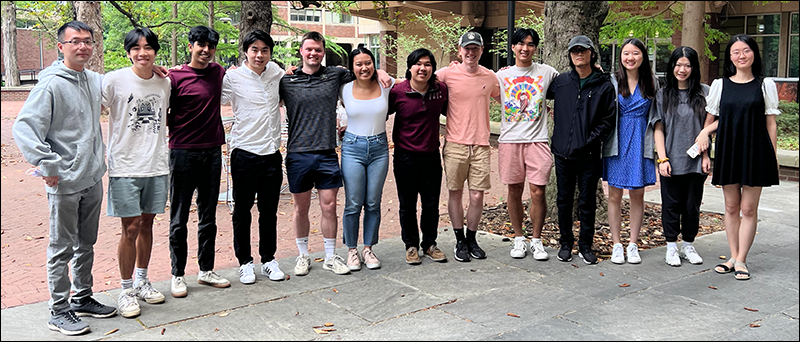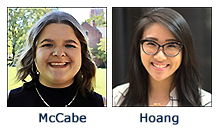
This past summer, 13 Vanderbilt undergraduates were selected to work on projects focused on epilepsy, miniature soft climbing robots, stroke treatment, kidney disease research, cancer resection and surgical skill assessment as part of the Vanderbilt Institute for Surgery and Engineering’s Summer Fellows Program (VSF).
Each students gained valuable research experience working in a VISE lab under the supervision of the director. This year, events designed to develop soft skills such as time management, communication and networking were added to the summer program to round out the student experience.
“We really saw a sense of community develop among VSF participants this summer. Their social gatherings, working group sessions, and interaction with graduate students were a great addition to the program,” said Benoit Dawant, Cornelius Vanderbilt Professor of Engineering and director of VISE.
 Mechanical engineering graduate student Emily McCabe and Nhung Hoang, graduate research assistant in computer science, members of the Women of VISE group, returned to facilitate the popular Technical Communication in Research and Refining Your Professional Image workshops.
Mechanical engineering graduate student Emily McCabe and Nhung Hoang, graduate research assistant in computer science, members of the Women of VISE group, returned to facilitate the popular Technical Communication in Research and Refining Your Professional Image workshops.
“The program’s culmination, the seminar where each participant delivers a 5-minute presentation, was nothing short of remarkable. The room was overflowing, and the breadth and quality of the work presented was truly amazing,” Dawant said. “A special thanks to Emily and Nhung for running their workshops, to the PIs and graduate students for their guidance and mentorship, and to Michelle Bukowski for her outstanding coordination and management efforts.”
Returning VSF Rebecca Pan worked with Kenny Tao, assistant professor of biomedical engineering, in the Diagnostic Imaging and Image-Guided Interventions (DIGGI) Lab, to extract macular hole dimensions from optical coherence tomography (OCT) scans.
Pan, a biomedical engineering major, said her favorite part of the program was getting to interact with other fellows through various events as well as having the opportunity to work more closely with her mentors throughout the summer.
Computer Science major Rohan Rashingkar enjoyed the welcoming environment in the Brain Imaging and Electrophysiology Network (BIEN) Lab with director Dario Englot, associate professor of neurological surgery and of biomedical engineering. Working on the design and implementation of a neural network model to distinguish consciousness-sparing and consciousness-impairing seizures using intracranial EEG data, Rashingkar said he enjoyed meeting new people interested in similar fields in his lab and at VISE events.
Nick Cui worked in the Biomedical Elasticity and Acoustic Measurement (BEAM) Lab with Brett Byram, Hoy Family Faculty Fellow and associate professor of biomedical engineering. Cui, a biomedical engineering major, worked to improve a machine-learning algorithm through adjusting the shape of the network to better improve transthoracic echocardiography, a type of imaging of the heart. Cui said working directly with his grad student mentor as well as his principal investigator were unique experiences he could not have found elsewhere.
Biomedical engineering majors Xander Stabile and Nathan Zhang both worked in the Biomedical Modeling (BML) Lab with Michael Miga, Harvie Branscomb Professor of Biomedical Engineering and interim chair of the department. Stabile and Zhang both noted that the workshops, social events, and working groups were their favorite parts of the program.
Stabile, a returning VSF, said he felt more connected to the group this year. “I felt as if I got closer with my fellows, knew their research better. This all contributes towards feeling more connected with research peers.”
Stabile’s research consisted of multiple optical tracking projects. Zhang investigated ways to evaluate the positive effects of clinically immersive courses on engineers’ abilities to identify, solve, and write about provocative questions regarding surgery.
Mechanical engineering majors, Yilan Xu and Hieu Vu worked with Xiaoguang Dong, assistant professor of mechanical engineering, in the Miniature Robotics Lab.
Xu made a tiny, flexible robot that can be controlled from a distance using magnets. The robot is designed to move on tissue inside the body for precise medical procedures. Vu designed flexible circuits with integrated Bluetooth System-on-a-Chip for wireless sensing and actuation in miniature robotics.
Both students enjoyed the work environment in the lab. However, it was the final presentation during the fall seminar series that Xu enjoyed most. “I feel very grateful for being able to present my research to a large audience. It was a novel experience that helped me develop my skills greatly,” he said.
Seth Hemingway worked under the leadership of Nabil Simaan, professor of mechanical engineering, and graduate student mentor Jared Lawson in the Advanced Robotics and Mechanism Applications (ARMA) lab.
Hemmingway, a biomedical and electrical and computer engineering major, worked on phantom models for Ischemic stroke treatment. He also shared Xu’s enthusiasm about the final presentation, noting the workship on technical communication in research helped him feel more prepared and confident to present to the greater VISE community.
Leo Zhang was the first VSF for VISE faculty member James Weimer, assistant professor of computer science, and his Internet of Medical Things (IoMT) Lab. Zhang, a computer science major, developed a web application to aid in research on the relationship between kidney disease symptoms and sedentarism. Zhang said he feels as if he’s “grown a lot as a professional and gained many new connections and skills.”
Daniel Moyer, assistant professor of computer science, welcomed computer science major Cheng Qiu to the Visual Informatics and Engineering (VINE) lab. Qiu was tasked with improving the accuracy of the U-Net, which is the most prominent model used in image segmentation, by altering its architecture.
Qiu commented that meeting graduate mentors from other labs was “quite insightful and enjoyable.” Qiu thanked graduate mentor Yehyun Suh for providing a tremendous amount of guidance and assistance throughout his time in the lab.
Kelly Xu joined the Machine Automation, Perception, and Learning (MAPLE) Lab. Working with Jie Ying Wu, assistant professor of computer science, and graduate student mentor Ayberk Acar, she developed software that enables surgeons to upload and visualize holographic reconstructions of resected cadaver tissues through a head-mounted augmented reality (AR) display.
Xu, a computer science major, said one of the most rewarding aspects of program was the opportunity to connect with the fellows throughout the summer.
Returning VSF Kate Wang spent her summer examining the effects of fMRI patterns linked with vigilance (levels of wakefulness or alertness) on cognitive impairment in the aging brain. Wang was mentored by graduate student Sarah Goodale and Neuroimaging and Brain Dynamics (NEURDY) lab director Catie Chang, Sally and Dave Hopkins Faculty Fellow and assistant professor of computer science.
Wang, a computer science major, said being part of the program has equipped her with the skills to move towards being an independent scientific researcher. “My favorite parts of being a VISE Summer Fellow were getting to interact with all of the other summer fellows through the various events we had this summer and having the opportunity to work more closely with my mentors throughout the summer.”
The Machine Intelligence and Neural Technologies (MINT) lab, directed by Soheil Kolouri, assistant professor of computer science, welcomed CS major Zhanqi Zhu, who developed a surgical skill assessment that distinguishes the skill level of a surgeon using their recorded surgery videos.
Like many of her colleagues, Zhu said the weekly events were a good opportunity to connect with other fellows.
The VISE Summer Fellows program provides financial support to students and the program is managed by Michelle Bukowski, VISE program coordinator.